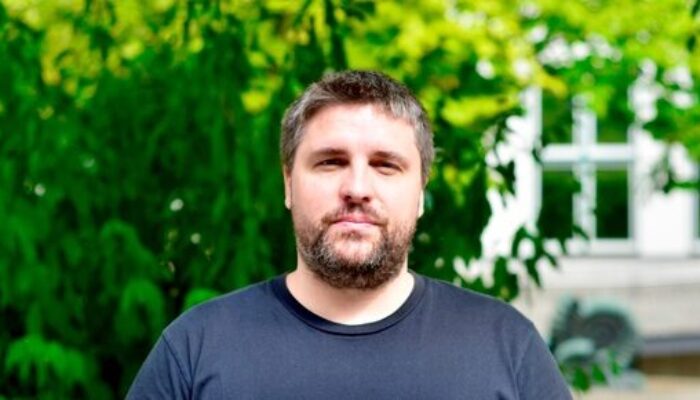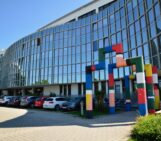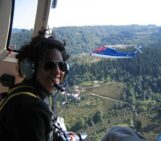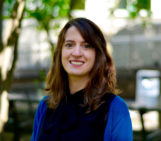
‘What I wish someone told me early in my career’ is a new Geolog series that aims to provide valuable insights and guidance to early-career professionals within the European Geosciences Union (EGU) community. Each month, I will interview a staff member of EGU to share their personal career journey, experiences, challenges faced, and the tips they wish they had received earlier in their careers. This month, I am having a chat with our IT Manager, Robert Barsch (He/Him). Robert joined the EGU office in 2010 as the organization’s website manager (Webmaster) on a part-time basis, and his role has evolved over the years to becoming our IT Manager, where his responsibilities include procuring and implementing hardware and software solutions, designing and managing websites, offering technical support to staff and EGU members, overseeing various online services, creating and maintaining data backup protocols, and addressing legal requirements such as GDPR compliance. Let’s get to know him!
Hello Robert and thank you for taking the time to speak with me today! I’m thrilled to learn more about your journey at EGU and the pivotal role IT plays in its operations. Let’s start at the beginning: Can you share your journey to becoming the IT Manager at EGU? What initially attracted you to this role and organization?
Pure coincidence! I have always been very IT-savvy and therefore started studying geophysics. At the time, a purely IT-based degree programme felt too theoretical to me, while geophysics offered a balanced mix of math, physics, computer science, and geosciences—all subjects I had enjoyed growing up. I began studying geophysics in 1997 at TU Bergakademie Freiberg in Saxony. Concurrently, I pursued a Bachelor’s degree in Network Computing and ran a small web hosting business. While the business didn’t make me rich, it provided invaluable experience.
After completing my geophysics degree in 2004, I joined LMU Munich as a research associate, where I also earned my PhD. One of my tasks involved managing the institute’s webpages.
In 2010, I was invited to take over IT support and website management for the newly established EGU Office. At the time, I was seeking a new role due to the limited duration of temporary academic contracts in Germany, and the opportunity came at just the right time. It made sense to explore this path—and I’ve been here ever since!
How has your role evolved over the years? Could you include your initial title and starting year, as well as key milestones that stand out?
For context: IT for EGU’s day-to-day office operations is separate from the IT needs for the General Assembly, which are managed by our Conference Manager, Copernicus GmbH. My responsibilities focus solely on the EGU Office.
When I first joined in 2010, I was employed part-time as a “Webmaster.” My initial tasks were relatively straightforward: extending existing webpages and providing IT support for the two other employees in the office. At that time, the office and IT infrastructure were hosted by LMU, which felt a bit underwhelming for someone with a PhD in geophysics.
Things changed quickly, though. As of the end of 2024, the EGU Office has grown to 12 employees. We now operate out of our own office space, complete with a server room and a fully self-managed IT infrastructure. My role has expanded to include acquiring and deploying hardware and software, programming and maintaining websites, providing IT support for staff and EGU members, administering numerous web-based services, developing backup strategies, and even handling legal matters like GDPR compliance.
Given the expanding needs of the EGU, we may also need to look for an additional IT team member in the future.
What do you consider the most significant IT challenges EGU has faced, and how have you addressed them?
Fortunately, there haven’t been any major incidents, such as hacking attacks or data theft, so far. However, it’s only a matter of time before an organization like EGU encounters such challenges. A single zero-day exploit could breach our systems despite our best efforts to maintain security.
To minimize potential damage, we prioritize reducing the collection and use of personal data to an absolute minimum, encrypt data whenever possible, and maintain robust backup strategies. Systems are kept up to date, and data and system security are consistently aligned with the latest technological standards.
What are the most critical technologies or systems that keep EGU running smoothly?
There are too many critical systems to highlight just one. However, in IT, it’s crucial to avoid over-reliance on specific components or vendors. This is why we prioritize free and open-source software wherever possible—it allows us flexibility and cost efficiency while avoiding vendor lock-in.
How do you stay current with rapid changes in technology while managing EGU’s systems?
I primarily keep up with IT developments through industry news. However, the need to replace outdated or unsupported components is often the main driver for adopting new technologies. When this happens, I research alternatives, test them, and implement the best solution.
One question that I had in mind for a while, is how has EGU’s IT infrastructure adapted to remote work especially after the COVID-19 pandemic?
The adaptation to remote work was fairly straightforward. EGU’s executive office employees were provided with laptops, cloud storage was established for document sharing, and we started holding meetings via video conferencing software. For this transition, IT wasn’t the main challenge— it was the adjusting to remote work itself, which was more significant to some of us.
Looking ahead, what emerging technologies do you see as game-changers for EGU’s operations?
Generative AI is one to watch out for! I personally see it more as a challenge than a benefit. While it consumes massive resources and often produces mediocre content, it also floods the internet and has been reducing the visibility of human-created work. This makes it increasingly difficult to distinguish authentic content, which is concerning for EGU’s operations, as we rely heavily on remote interactions and trust.
What do you appreciate most about your work at EGU?
I would say variety! The rotation of EGU committees and Council members constantly brings fresh ideas and keeps me engaged.
Thank you so much for your time, Robert! To conclude, I would love it if you could share one piece of advice with someone aspiring to a career in IT!
Stay curious—IT is constantly evolving, and staying updated is essential.




